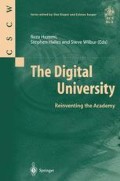Abstract
MUDs and MOOs (Multi-User Domains and MUDs Object Oriented) are multiuser programs which support both synchronous and asynchronous discussion over the Internet. They support a rich, text-based virtual environment developed using a built-in object-oriented programming language. They have been used in various educational contexts such as creative writing, language learning, virtual campuses and to support research communities. Experience suggests they are good at encouraging cooperative and creative learning.
Access this chapter
Tax calculation will be finalised at checkout
Purchases are for personal use only
Preview
Unable to display preview. Download preview PDF.
References
Madden, N. E. and Slavin, R. E. (1983) Cooperative learning and social acceptance of mainstreamed academically handicapped students. Journal of special education,1983, 17, 171–182.
Slavin, R. E. (1990) Cooperative Learning: Theory, Research and Practice. Prentice Hall, London.
Dansereau, D. F. (1988) Learning and Study Strategies: Issues in Assessment, Instruction, and Evaluation. Academic Press, New York.
Webb, N. (1985) Learning to cooperate, cooperating to learn. Plenum Publishing. New York.
Dillenbourg, P., Baker, M., Blaye, A. and O’Malley, C. (1994) The Evolution of Research on Collaborative Learning. http://tecfa.unige.ch/tecfa/research/lhm/ESFChap5.text
McKendree, Jean and Mayes, J T. (1997) The Vicarious Learner: investigating the benefits of observing peer dialogues. CAL ‘87, Easter 1997, University of Exeter.
Curtis, Pavel and Nichols, David A. (1996) MUDs Grow Up. Social Virtual Reality in the Real World, Xerox PARC, Palo Alto, CA. ftp://ftplambda.moo.mud.org/pub/M00/papers/MUDsGrowUp.txt
Bartle, Richard. (1990) Early MUD history. http://www.apocalypse.org/pub/u/Ipb/muddex/bartle.txt
Bruckman, Amy. (1993) Gender Swapping on the Internet. The Internet Society, San Fransisco, CA, August 1993 ftp://ftp.media.mit.edu/pub/asb/papers/genderswapping.txt
Reid, Elizabeth. (1995) Virtual Worlds: Culture and Imagination. Cyber Society: Computer Mediated Communication and Community, Jones, Steven G. (Ed.), Sage, London, 164–183.
Haynes, Cynthia and Holmevik, Jan Rune (Eds.) (1997) High Wired: On the Design, Use, and Theory of Educational MOOs. The University of Michigan Press, Michigan.
Harris, Leslie. (1998) Composition in Cyberspace: A Model for Collaborative Teaching and Learning. Susquehanna University, n.d.http://www.cyberstation.net/~idd/v2/1harrisj.htm
Moock, Colin. (1996) Communication in the Virtual Classroom. http://colinmoock.iceinc.cotn/nostalgia/virtual_classroom.html
Bruckman, Amy (1994) Programming for Fun: MUDs as a Context for Collaborative Learning. National Educational Computing Conference. Boston, MA, June 1994. ftp://ftp.media.tnit.edu/pub/asb/papers/necc94.txt
Germundson, Noel (1994) The Social and Educational Aspects of MUDs. Carleton University Working Papers in Communication Technology and Culture,http://www.oise.on.ca/~jnolan/muds/about_muds/mud.paper
Turbee, Lonnie (1996) Mooing in a foreign language: how, why, and who? Information Technology Education Connection’s International Virtual Conference/Exhibition on Schooling and the Information Superhighway, June 3–9, Centre for Teacher Librarianship, Charles Sturt University, http://www.web.syr.edu/~lmturbee/itechtm.html
Robinson, D. and Fitter, M. (1992) Supportive evaluation methodology: a method to facilitate system development. Behaviour and Information Technology. 11, 3, 151–159.
Kommers, P., Jonasson, D. and Mayes, J.T. (Eds.) (1992) Cognitive Tools for Learning. Springer-Verlag, Berlin.
Gibbs, Graham R. (1997) Soclnfo Guide to IT Resources in Sociology, Politics and Social Policy. Soclnfo CTI Centre, Stirling.
Ackerman, Mark S. and McDonald, David W. (1996) Answer Garden 2: Merging Organizational Memory with Collaborative Help. Proceedings of the ACM Conference on Computer Supported Cooperative Work (CSCW ‘86), November 1996, 97–105. [Also at http://www.ics.uci.edu/~ackerman/docs/cscw96.ag2/cscw96.ag2.html].
Gibbs, Graham R and Robinson, D. (1998) CAL as learning tool: lessons from educational theory. Using Technology Effectively in the Social Sciences,Henry, M. (Ed.) Taylor and Francis, London.
Chute, D. L. (1995) Things I wish they had told me: developing and using technologies for psychology. Psychology Software News. 6, 1, 4–9.
Fanderclai, Tari L. (1995) MUDs in education: new environments, new pedagogies. Computer-Mediated Communication Magazine, 2, 1, (January 1, 1995) page 8 http://www.december.com/cmc/mag/1995/jan/fanderclai.html
Brown, John Seely and Duguid, Paul. (1996) Keeping it simple. Bringing Design to Software, Winograd, T. (Ed.), Addison-Wesley and ACM Press, New York, 129–145.
Author information
Authors and Affiliations
Editor information
Editors and Affiliations
Rights and permissions
Copyright information
© 1998 Springer-Verlag London
About this chapter
Cite this chapter
Gibbs, G.R. (1998). Modifying Multi-user Discussion Systems to Support Text-based Virtual Learning Environments on the Web — the coMentor Experience. In: Hazemi, R., Hailes, S., Wilbur, S. (eds) The Digital University. Computer Supported Cooperative Work. Springer, London. https://doi.org/10.1007/978-1-4471-0625-8_9
Download citation
DOI: https://doi.org/10.1007/978-1-4471-0625-8_9
Publisher Name: Springer, London
Print ISBN: 978-1-85233-003-3
Online ISBN: 978-1-4471-0625-8
eBook Packages: Springer Book Archive

